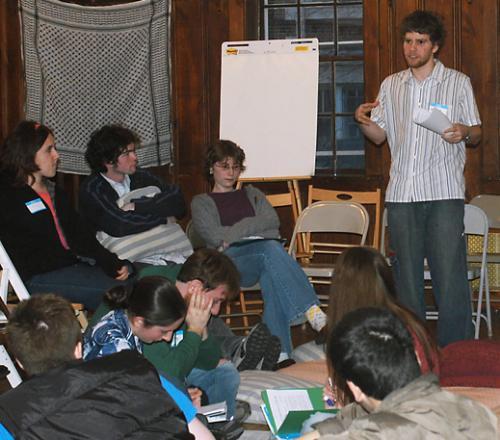
News
Cambridge Residents Slam Council Proposal to Delay Bike Lane Construction

News
‘Gender-Affirming Slay Fest’: Harvard College QSA Hosts Annual Queer Prom

News
‘Not Being Nerds’: Harvard Students Dance to Tinashe at Yardfest

News
Wrongful Death Trial Against CAMHS Employee Over 2015 Student Suicide To Begin Tuesday

News
Cornel West, Harvard Affiliates Call for University to Divest from ‘Israeli Apartheid’ at Rally
Student Groups Pool Power

Leaders of campus organizations converged on 45 Mt. Auburn Street Friday night to introduce a new combination of resources which they hope will improve their collective ability to bring about change at Harvard.
The first annual meeting of the Harvard Social Forum (HSF) also served as a mixer for members of the 25 mostly political and cultural campus organizations who sponsored the event.
More than 120 students preregistered for the weekend’s events, which included a variety of instructional meetings and student-led workshops on social issues ranging from AIDS and racial disparities in imprisonment, to socially active art and student empowerment.
In addition to the workshops, the HSF presented attendees with a proposal for a Harvard Student Union, a coalition of student groups to create “the most powerful student movement possible within this, the most powerful of universities,” according to the proposal for the union.
Mike Gould-Wartofsky ’07, who hosted the initial meeting with Rachel Bolden-Kramer ’06 and Aaron K. Tanaka ’04, described the weekend as a “campus-wide gathering of forces of change.” He said he envisions the proposed Harvard Student Union as a “force that will be strong enough to be independent of the university” and sustainable beyond the current leaders’ graduations.
He said organizers designed this weekend’s events and proposed the union to address issues from “democratizing Harvard, to local politics, to national issues.”
To break the ice between its diverse group of participants, the opening meeting held a “one breath manifesto” during which students from the College and several graduate schools introduced themselves.
Grace C. Wilentz ’07 said she had not found an activist scene on campus that she could identify with, and felt the forum would provide a “taste of what everything has to offer, and where I could be of the best help.”
Like many students at the HSF, Harvard Initiative for Peace and Justice (HIPJ) member and graduate student Suvrat Raju said that there “really is a need” for a network like the union.
Though the HSF focused on combining resources towards common goals, the meeting on Friday also provided an opportunity for student groups to publicize their distinct issues. HIPJ distributed flyers from the International A.N.S.W.E.R. coalition opposing “colonial occupation” in Iraq and Palestine and the group Women in Prison advertised a “photo/audio show” in the Adams Art Space.
The HSF calendar suggests more than a dozen events between now and the end of the academic year—including a march on Washington for freedom of choice—and beyond it, such as the national Hip Hop Political Convention in New Jersey this June.
Want to keep up with breaking news? Subscribe to our email newsletter.
